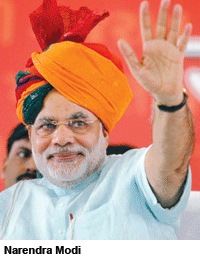Gujarat: Persistent plaintiff
Gujarat chief minister Narendra Modi is a practitioner of aggressive adversorial politics. A telling example is his prolonged legal battle to resist the appointment of a Lok Ayukta (ombudsman) in Gujarat. The appointment of a Lok Ayukta with powers to investigate and prosecute corrupt state government officials was politically blocked for almost a decade by the combative chief minister, who following his third electoral triumph in the assembly elections held last December, has emerged as a BJP prime ministerial candidate in the next (2014) general election.
When in August 2011, in an unprecedented move the Gujarat state governor Kamla Beniwal appointed Justice (Retd.) R.A. Mehta as Lok Ayukta, Modi challenged the appointment in the high court which upheld the appointment in January 2012. Unfazed, he appealed to the Supreme Court which also validated the appointment in early January this year. Nothing loath, the chief minister has filed a review petition which is pending adjudication.
 Now a similar litigation war is brewing in Gujarat over the issue of implementing a Central government scheme of 2008 mandating pre-matriculation scholarships for religious minority students, a red rag to the chief minister who is stridently against “minorities appeasement politics’’. On February 20, a division bench of the Gujarat high court directed the state government to immediately implement the scheme for religious minorities — Muslims, Christians, Sikhs, Buddhists and Parsis.
Now a similar litigation war is brewing in Gujarat over the issue of implementing a Central government scheme of 2008 mandating pre-matriculation scholarships for religious minority students, a red rag to the chief minister who is stridently against “minorities appeasement politics’’. On February 20, a division bench of the Gujarat high court directed the state government to immediately implement the scheme for religious minorities — Muslims, Christians, Sikhs, Buddhists and Parsis.
The pre-matric scholarship scheme formulated as part of the prime minister’s 15-point programme for the welfare of minorities became nationally effective from April 1, 2008. It’s applicable to class I-X students of government or private schools averaging 50 percent, and whose household annual income is below Rs.1 lakh. The subsidy amount per student is a modest Rs.850 per annum with 75 percent contributed by the Centre and the state government obliged to pay the remaining 25 percent. With the Central scheme having identified 52,620 beneficiaries in Gujarat, the burden on the state government for implementing the scheme aggregates a mere Rs.4 crore per year.
Predictably, the Modi administration preferred to dole out the scholarship amount to scheduled castes and scheduled tribes (SCs and STs) rather than to religious minority students. Describing the scheme as discriminatory and violative of Article 15 (1) of the Constitution which prohibits discrimination on “grounds of religion, race, caste, sex or place of birth,’’ but falling within the ambit of Article 15 (4) which permits positive discrimination in favour of SCs and STs, the Modi government refused to implement it.
This prompted a PIL (public interest litigation) writ by a BJP activist in 2008 praying for a high court order quashing the scholarship scheme on grounds that it diverted national resources in favour of religious minority communities and was discriminatory, arbitrary and violative of constitutional provisions. The PIL was dismissed in 2009. But with the state government adamantly refusing to implement the scheme, a PIL was filed against it in 2011 for a mandatory court order. Even as these petitions were pending in the Gujarat high court, the pre and postmatric scholarship schemes for minorities were upheld by the Bombay high court.
Both the public interest petitions filed before the Gujarat high court came up before a division bench which was acquainted with the Gujarat and Bombay high court judgements on the issue.
However, the bench was unable to accept the ratio decidendi of these judgements. It therefore referred the case to a larger five-judge bench. On February 15 in a 3-2 ruling, the Gujarat high court held that the pre-matric scholarship scheme is not violative of the constitutional provisions cited in the PIL, and referred the case back to the division bench which has directed the state government to implement it immediately.
Inevitably, the Modi government intends to file an appeal in the Supreme Court against the high court judgement. It looks like a long wait is in store for the 52,620 minority community students identified as beneficiaries of the scheme. By then the per capita scholarship provision of Rs.70 per month will be nullified by inflation.
R.K. Misra (Gandhinagar)















Add comment